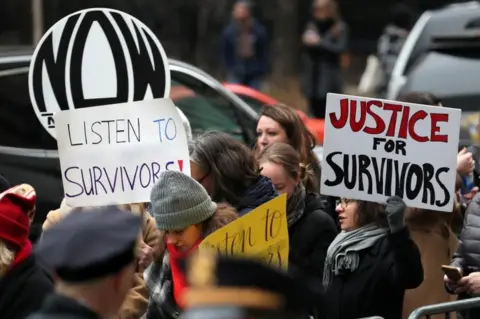Harvey Weinstein appears in New York court for sex assault trial
Film producer Harvey Weinstein has appeared in court in Manhattan to face charges of rape and sexual assault.
He has been accused of sexual misconduct by more than 80 women, but faces charges related to only two.
The movie mogul has admitted that he has "caused a lot of pain" but said all of his relationships were consensual.
Outside court, some of his accusers including actresses Rosanna Arquette and Rose McGowan demanded he be held accountable.
His lawyers have vowed to mount an aggressive defence. The claims against him helped form the #MeToo and Time's Up movements against sexual impropriety.
Mr Weinstein, once one of Hollywood's most powerful producers, faces five charges including rape and sexual assault, and could be jailed for life if convicted.
Jury selection began on Monday, with the trial expected to begin properly in around two weeks.
As he did during his bond hearing in December, Mr Weinstein used a walking frame as he entered the courthouse in downtown New York City.
His lawyers say he requires the medical device due to a back injury.
 Getty Images
Getty ImagesWhat happened on Monday?
At the scene - Ritu Prasad, BBC News, New York
Harvey Weinstein entered the courtroom to near silence, hunched over a walker in a black suit. He has been described as frail in recent weeks and it held true today - throughout the proceedings he alternated between gazing downwards or pressing his hand against his face.
These first pre-trial proceedings of the Hollywood movie mogul were also marked by a number of sharp exchanges between the state prosecutors and the producer's defence team. There were tensions over showing sensitive photographs to jurors during the trial; over redacted evidence; over the defence's treatment of witnesses.
Mr Weinstein's defence however maintained that "he's not looking for a mistrial" - just a conclusion.
As these initial debates commenced in the New York State courthouse, outside several protesters with the Silence Breakers group spoke to the press.
Among them was Actress Rose McGowan, who addressed Mr Weinstein in her statement, saying: "Today Lady Justice is staring down a super predator - you."
It's a good indication of what this case means to so many - the culmination of years of social movements in the fight to improve women's rights in the US justice system.
At the end of this first day of proceedings, Judge James Burke said jury selection would begin, as normally as possible, though he acknowledged finding jurors in a timely manner may be an "ambitious" notion.
Thus dismissed, Mr Weinstein left the room as he entered it - slowly moving down the aisle, expressionless.
What is he charged with?
Mr Weinstein, who was behind hit films including Shakespeare in Love, The King's Speech and Pulp Fiction, is accused of raping one woman in a hotel room in 2013 and sexually assaulting another in his apartment in 2006.
He was charged in May 2018 after the New York Times and New Yorker simultaneously published bombshell reports about his alleged misconduct.
He was released the following month after paying a $1m bail (£760,000).
What was said outside the court?
Rosanna Arquette, who says Mr Weinstein sabotaged her acting career after she rejected Mr Weinstein's advances, told reporters outside the court that "time's up on the pervasive culture of silence that has enabled abusers like Weinstein".
Addressing Mr Weinstein, actress Rose McGowan - who says she was raped by the movie producer - said: "You brought this upon yourself by hurting so many. You have only yourself to blame."
Referring to his walker, who some have argued he is only using in an attempt to garner sympathy from the court, she said "I think he's taken some good acting tips".
How is a jury selected in the US?
In criminal cases such as Mr Weinstein's, the US constitution guarantees the right to trial by an impartial jury.
A large pool of potential jurors is selected by random from lists of registered voters and is quickly whittled down by lawyers asking about their knowledge of the case.
Trials involving high-profile defendants mean potential jurors will have been exposed to publicity about the case and could therefore be prejudiced.
Jurors in the Weinstein trial will inevitably be asked about the #MeToo movement but it will be hard to find people who have not been affected by the blaze of publicity surrounding it.
That's why two weeks has been set aside for the Weinstein case. It took three weeks to find jurors for the OJ Simpson murder trial.
To be eligible, a person must be: a US citizen; at least 18 years old; a resident within the court's jurisdiction.
Those qualified are summoned to court, where they are questioned by the judge and lawyers involved in the case, a process called voir dire (derived from Latin phrase "to speak the truth"). They are told not to watch or read any news about the case during the trial.
Prosecution and defence lawyers can object to the selection of jurors if they have grounds to believe they will prejudice the case. For example, objections may be raised to a juror who personally knows the defendant or has strong prejudices towards them.
Lawyers can exclude a certain number of jurors, but cannot do so on the basis of race, gender or class. The jurors are then sworn in, marking the start of the trial proper.
